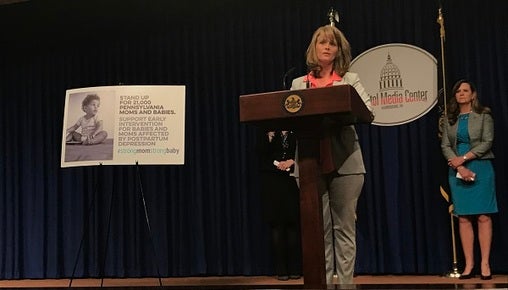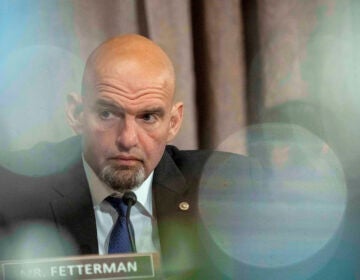A bipartisan group wants more resources for postpartum depression in Pa.
Identical bills in the House and Senate aim to connect mothers with the early intervention program.

Kim Manfredi, who struggled with postpartum depression, said earlier intervention might have kept her son from needing as much special education as he does. (Katie Meyer/WITF)
Several Pennsylvania state lawmakers are trying to boost a proposal that would qualify women with postpartum depression for support through the state’s early intervention program.
The measure is currently stalled, as legislative committees try to figure out how much it would cost.
Postpartum depression, a mood disorder that can cause deep sadness, anxiety, and exhaustion, affects about one in seven women, which translates to 21,000 or so women in the commonwealth.
But many who screen positive don’t get treatment.
That’s what the identical bills in the House and Senate aim to correct, by linking mothers with the early intervention program.
Currently, the program helps parents get screenings and follow-up services if a child has a low birth weight or needs intensive neonatal care; if the family is homeless; if a child is born to a mother with an addiction; or a number of other situations.
If postpartum depression is added, qualifying children would get those same services, and moms could get referrals for mental health care.
Kim Manfredi, who has struggled with postpartum depression and now works with the Washington, Pennsylvania -based Postpartum Depression Project, noted the condition has been found to hinder child development — which could require more resources later on.
“If at 8 months old, my son had early intervention services, would he be needing three special-education resource teachers over the last three years?” she said.
The proposed bills don’t mandate that doctors screen for postpartum depression — something several states have done.
Dr. Eina Fishman, with Gateway Health Plan, said she thinks mandates can backfire.
“When you tell people they have to do something, sometimes physicians can be a little annoyed about that,” she said. “You have to educate physicians, you have to educate moms and families about what the issues are.”
House lawmakers report the Department of Human Services has estimated the measure would add about $900,000 to early intervention costs — a number Luzerne County Republican and co-sponsor Tarah Toohil called “chump change.”
“All of us are in agreement that if we make that investment now, it’s going to be wholly preventive for a lot of these children,” she said.
There’s some disagreement over that number, however. The bill’s Senate supporters said they might try to pass it for a trial period first, to see how many people use the expanded services.
WHYY is your source for fact-based, in-depth journalism and information. As a nonprofit organization, we rely on financial support from readers like you. Please give today.





